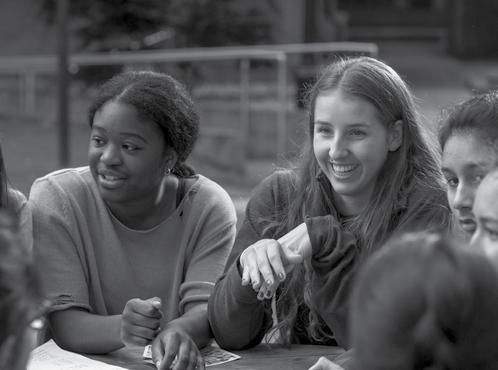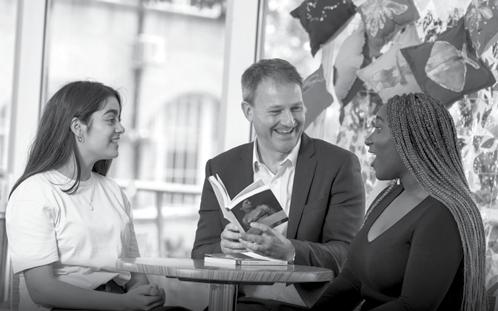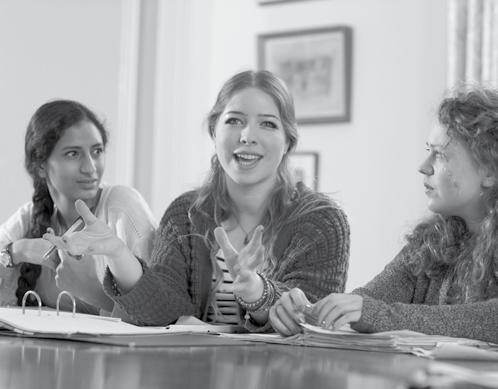
13 minute read
Greek
Greek (GROUP 2)
All candidates, both at Higher and Standard Level, take the three parts listed below.
Advertisement
Part 1: Study of the language
Students improve their language skills through consolidation of grammar from GCSE and exploration of further morphology and syntax, applied to general reading from classical literature. In the second year we begin to specialise, reading extracts from the historical, and other writings of the wonderfully varied and prolific historian Xenophon. A passage from this author is set for translation in the examination. Dictionaries may be taken into the examination room, and there is focus on broad vocabulary learning in both years based on recommended lists generated by the IBO and the North London Collegiate School Classics department.
Part 2: Literary Study
We study at least two genres over the course of the two years (the Higher Level prescription is greater in length). These vary from year to year: the texts are usually drawn from the epic poetry of Homer, the famous tragedies of Sophocles or Euripides, or the weird and wonderful ‘Histories’ of Herodotus. In addition, particularly at Higher Level, we read further in translation to gain a broader feel for the authors and their world. Both Higher and Standard Level are tested on their study of literature through a single examination. Part 3: Individual Study Internal Assessment
Candidates complete a piece of internal assessment known as a Research Dossier, an annotated collection of source materials relating to a topic in classical history, literature, language, religion, mythology, art or archaeology, chosen by the candidate. Recent topics chosen by students have included the training and practices at the Olympic Games, the Underworld in ancient literature and the Greek trireme warship. This part of the course offers students the opportunity to explore their own areas of interest through close analysis of primary sources.
Economics (GROUP 3)
Economics is a dynamic social science, forming part of Group 3 – Individuals and Societies. At its heart, Economics provides a framework for decision-making, as individuals or collectively as a society. In a world with limited resources including time, money and clean air, how do we maximise our wellbeing as individuals, a nation or as a global community? The subject can also lead to a better understanding of modern life and international affairs, from analysing the price of a pint of milk to understanding the effects of Brexit under different scenarios.
Economics opens up a variety of career paths including investment banking, management consultancy and economic journalism. Economists might be assisting governments in developing countries on poverty reduction strategies or advising UK policy makers on how to attain zero net carbon; they may work in central banks reducing the chance of the next financial crisis or within think tanks or universities researching global inequalities. In fact, most careers benefit from a knowledge of Economics and new areas of the subject are opening up all the time. These days you can take university modules in fields such as health economics, environmental economics, behavioural economics or feminist economics.
The study of Economics also offers a variety of transferable skills useful for many careers, including: how to construct a well-evidenced argument; evaluating an argument with different viewpoints and by questioning assumptions; a basic understanding of the use of economic models; statistical data handling skills; and an understanding of how mathematics can be applied to a variety of real world situations. Syllabus Outline:
1. Microeconomics – introduces basic terminology, themes, ideas and problems 2. Theory of the Firm (HL only) – applies microeconomic theory to businesses and explores quantitative methods for analysing firms’ behaviour 3. Macroeconomics – examines issues relevant to whole economies, such as economic growth, unemployment and inflation 4. International Trade – this includes topics such as why countries trade, why countries might use protectionism, how exchange rates work and why they matter. There is also a section of the course which looks at why some countries are richer than others, and what solutions may help to reduce these inequalities.
Distinction between SL and HL:
SL and HL students of Economics are presented with a common syllabus, with an HL extension in some topics. The main difference is that the study of the ‘Theory of the Firm’ is HL only, this is because it requires a little more quantitative skill than other parts of the course. HL students also have to complete a third paper which is more numerical in content. The quantitative requirements of HL Economics do not present much of a challenge for NLCS students however, so no student should be put off HL Economics even if they feel they are not particularly strong in mathematics.
Assessment Information (SL and HL):
Higher Level
Standard Level
Paper 1 Extended Response 20% (1 hour 15 mins)
Paper 1 Extended Response 30% Paper 2 Data Response 30% (1 hour 15 mins) (1 hour 30 mins)
Paper 2 Data Response 40% Paper 3 Policy Response 30% (1 hour 45 mins) (1 hour)
Internal 3 commentaries on 30% Internal 3 commentaries on 20% (self-chosen) articles (self-chosen) articles each of 750 words each of 750 words
Considering studying Economics at university?
The majority of undergraduate Economics courses will have at least SL Mathematics as an entry requirement, whilst undergraduate Economics at the most competitive institutions may require students to have HL Mathematics.

Geography (GROUP 3)
Geography is concerned with the ‘study of place’. It provides awareness, knowledge and understanding of physical environments as well as global development and citizenship in a changing and increasingly interconnected world. In the Sixth Form, the emphasis of the subject is on the interaction of physical and human environments and the promotion of a global perspective and international understanding. Geography is a very topical subject focusing on current environmental, socio-economic and cultural issues.
All students (SL and HL) study Geographical Perspectives- Global Change.
• Population distribution – changing population • Global climate – vulnerability and resilience • Global resource consumption and security
In addition to the core themes, at SL students study two and HL students three of the following geographical themes:
• Freshwater drainage basins • Oceans and coastal waters • Geographical hazards • Leisure, sport and tourism • Food and Health • Urban environments HL Core Extension • Geographic perspectives – global interactions • Power, places and networks • Human development and diversity • Global risks and resilience Students will also study geographical skills such as mapping, graphics, statistical analysis, and interpretation of satellite images and application of ICT. Both Standard and Higher Levels require a fieldwork report, which account for 25% (SL) and 20% (HL) of the total marks..
Geography is a broad-based subject, which teaches numerical literary and graphical communication skills as well as the analysis and interpretation of data. The subject also involves logical reasoning, problem posing and solving, decision-making and spatial awareness. These are all key transferable skills highly valued by employers. Geography provides an ideal link between the Arts and Sciences and combines well with many subjects, e.g. Biology, Physics, Mathematics, Economics and History. Students have gone on to pursue a wide variety of university and career opportunities such as medicine, law, psychology, engineering and HSPS (Human, Social and Political Sciences).
History (GROUP 3)
The aim of the IB History course is to look at events in the past from an international perspective. The course is concerned with explaining trends and developments, continuity and change through time and through individual events. In the contemporary context of globalisation and technological development, different cultures and societies are increasingly in contact and interdependent. Now, more than ever, there is a need for an understanding of the past, as well as the present. The IB History course seeks to consider the role of individuals and societies in the widest context: political, social, economic, religious, technological and cultural.
The process of historical enquiry, explanation and interpretation is a never-ending activity, for which historians develop values and conventions which themselves change over time. Students of History investigate a variety of sources, some of which may be of a contentious nature. As new generations seek to explain and analyse the past, they will face problems of determining the accuracy of what is claimed to be reliable historical knowledge and assessing conflicting interpretations of past events. The opportunities for opinions and interpretations which are culturally driven are many and they require sensitive but critical analysis. Each generation rewrites its own history in the light of new evidence and of subsequent events and processes, and under the influence of its particular attitudes and prejudices. Students should become aware that historical accounts involve judgements based on qualitative evidence and that these judgements might be revised. By studying History, they are taught to understand why the work of the historian differs over time and in different parts of the world, and how it is impossible for historians not to be affected, to some extent, by political and economic conditions. History is available at Standard (SL) and Higher Level (HL). All candidates sit two examinations at the end of Year 13, which are based on the following World History topics.
Paper 1:
This is a document-based paper. The topic studied will be an aspect of twentieth century world history which links with the Paper 2 topics. Currently, students study Italian, German and Japanese Foreign Policy, 1931-1941.
Paper 2:
This is an essay-based paper. The topics studied are Causes, Practices and Effects of War (The Second World War, The Falklands War and The Vietnam War) and Authoritarian States in the Twentieth Century (Germany and Hitler, China and Mao Zedong, USSR and Lenin/Stalin).
Paper 3 (HL ONLY):
This is an essay-based paper for HL students only. Students cover the exciting topics of the French Revolution (causes, key events, the Terror and the Revolutionary Wars), Napoleon to 1815, the Russian Tsars to 1917 and the Russian Revolution. In Year 13, they also look at the Spanish Civil War and Mussolini’s Italy.
Historical Investigation:
All candidates write a 2,200 word essay on a document-based historical investigation of their own choice. This is a problem-solving activity which enables candidates to demonstrate the application of their skills and knowledge to an area which interests them. The topic need not be related to the syllabus.
WHY STUDY HISTORY?
The study of History offers the chance to develop and practise a number of important skills. Its use of oral and written discussion develops the powers of argument and analysis which are recognised as essential for many degree courses and careers. It is equally appropriate for those studying arts or sciences. History is very well-resourced in the library and is supported by a lively and active History Society.
There are many opportunities to extend your interests and understanding beyond the classroom, through History Society talks and discussion groups, as well as trips and study tours. There are many such events in the Sixth Form, including trips to lectures, exhibitions and theatre productions in London.

Global Politics (GROUP 3)
With its roots in the nineteenth century struggle for gender equality, North London Collegiate School has always had a strong connection with the discipline of Politics, and this is reflected in the vibrancy and popularity of the subject in the Sixth Form. Students from North London regularly go on to study politics-related courses at university, including interdisciplinary courses such as PPE and HSPS.
IB GLOBAL POLITICS
The Global Politics course explores fundamental political concepts such as power, liberty and equality, in a range of contexts. It allows students to develop an understanding of the local, national, international and global dimensions of political activity. Global Politics draws on a variety of disciplines in the social sciences and humanities. It helps students to understand abstract political concepts by grounding them in real world examples and case studies, and also invites comparison between such examples to ensure a transnational perspective.
CORE CONTENT
(WRITTEN PAPERS):
All Standard Level and Higher Level students complete a common core entitled “People, Power and Politics”. This consists of four core units:
• Power, sovereignty and international relations • Human rights • Development • Peace and conflict
Each topic is taught over the course of a term and assessment takes the form of two exam papers, one essay-based and the other a response based upon the interpretation of political documents and sources.
ENGAGEMENT ACTIVITY
(INTERNAL ASSESSMENT):
All Standard Level and Higher Level students also undertake an engagement activity through which they study a political issue of interest. Students engage practically with the subject through a series of activities which they are responsible for designing and carrying out. For example, a candidate may choose to raise awareness of a political issue, such as child poverty. Engagement tasks could include: conducting interviews with NGOs and political figures working in this area; staging a debate on the issue; developing a publicity campaign in school. This task is assessed internally on the basis of an essay in which the student reflects on the political processes they have observed.
HIGHER LEVEL EXTENSION
(ORAL PRESENTATIONS):
Higher Level students also examine two contemporary global political challenges, through a case studies approach. Themes such as poverty, the environment and international security are explored through discursive tutorials throughout the course. These culminate in the production of a series of oral presentations, each of ten minutes length. The best two of these presentations are then submitted for assessment.
The study of Global Politics offers many opportunities for students to develop their interest in the subject, both within and beyond the classroom. Lessons provide ample occasion for discussion and debate, and students will be encouraged to attend lectures, make use of the media and listen to visiting speakers. The course is complemented by Politics and Current Affairs Society, as well as opportunities to participate in events such as the European Youth Parliament and mock elections. The course helps to develop the powers of argument and analysis which are the essential basis for many university degrees and also provides useful background for careers such as law and journalism.
Philosophy (GROUP 3)
IB Philosophy engages students in the activity of Philosophy as well as studying philosophical theories and arguments. It trains the mind and furthers one’s skills of analysis as it questions some of our most deeply and dearly held assumptions and beliefs. The course allows students to think rigorously about fundamental questions of truth and human understanding and fosters the skills of critical thinking, evaluation and being able to construct a logical argument.
Philosophy can be taken at Higher and Standard Levels. Students at both levels study a compulsory Core Theme which examines the question ‘What is a human being?’ This involves questions concerning the nature of freedom, the relationship between mind and body and human ability to empathise.
All students also study Ethics, Plato’s The Republic and undertake a philosophical investigation comprising 1,600 words. In addition, Higher Level students study Philosophy of Religion and Practical Criticism of unseen philosophical texts. The course will deal with such questions as: What is a person? Is there life after death? What do we mean by ‘good’? How do we make life and death decisions? Do people have a right to a child? Does God exist? How does psychology challenge religion? As well as being a fascinating study and a very worthy discipline, it is a very good support subject for any field of study, whether it be arts or science based. It is also particularly relevant to prospective medical students.
Philosophy combines well with other subjects. Past students have gone on to study a wide range of subjects at university all around the country, including Oxford and Cambridge. Philosophy is useful for careers in any field and develops skills and attitudes which can be invaluable in approaching Sixth Form and degree studies.




